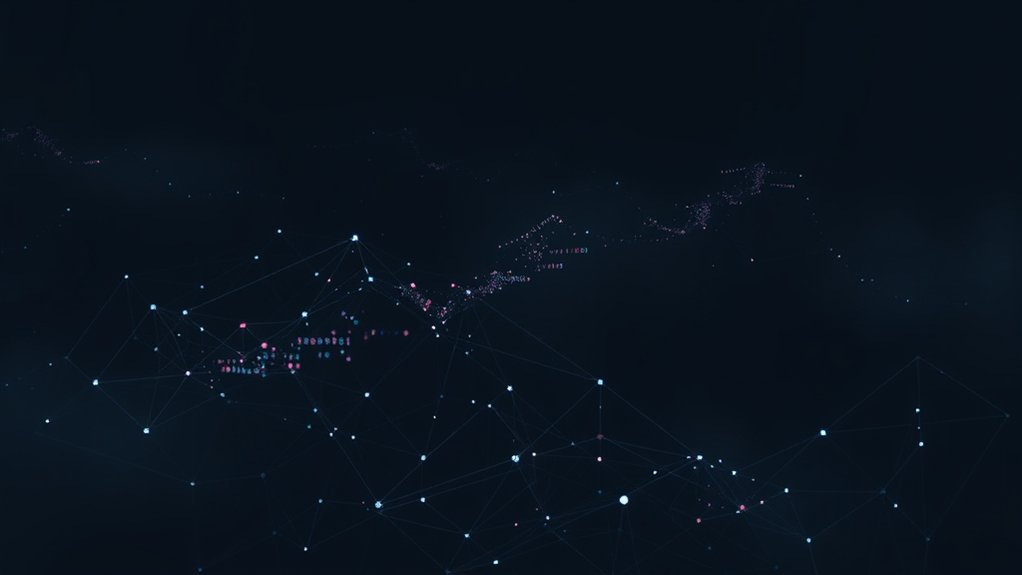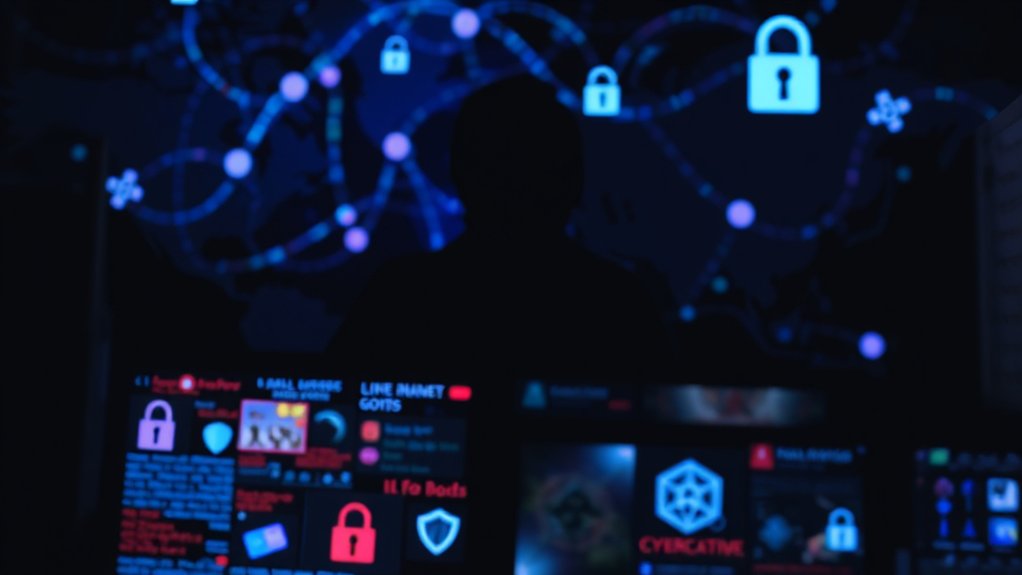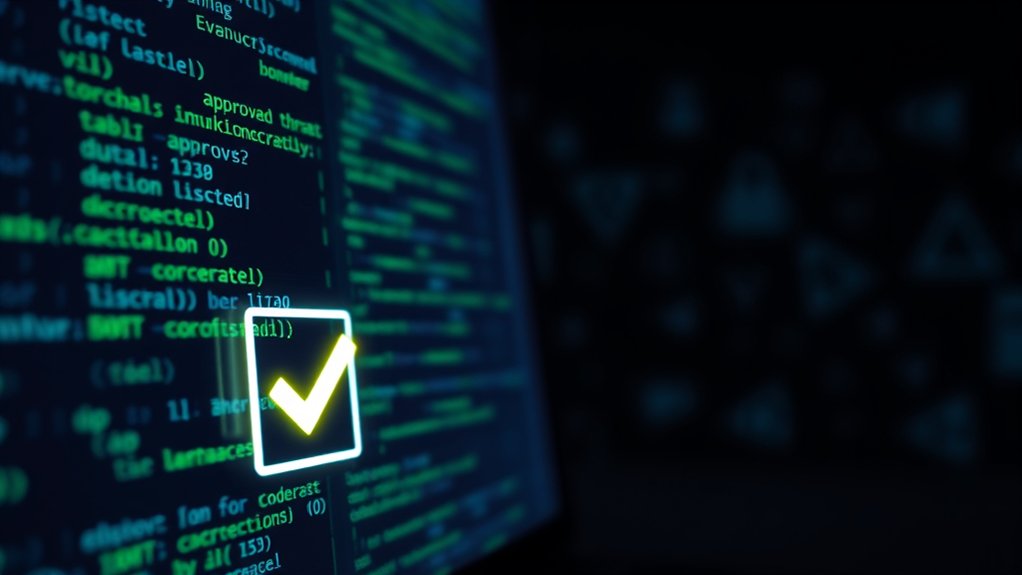The dark web is a concealed portion of the internet, accessed primarily via specialized software such as Tor. It is characterized by layered encryption, enabling anonymity for users. Though it facilitates legitimate activities—like secure communications for journalists and whistleblowers—it is likewise notorious for illegal transactions, which include illicit goods and services. Steering through this complex environment requires caution, as the potential for legal repercussions and cybersecurity threats exists. Further exploration reveals additional nuances of this hidden internet segment.

What expectations should individuals have when investigating the dark web? The dark web, a segment of the internet inaccessible through standard search engines, operates on encrypted networks designed to provide anonymity. Users must utilize specialized software, such as Tor, to traverse this concealed space.
When exploring the dark web, users must navigate encrypted networks using specialized tools for anonymity and security.
Historically, the dark web emerged from initiatives by the U.S. Department of Defense to facilitate secure communications, but today it serves various purposes, encompassing both legitimate and illegal activities.
One key feature of the dark web is its commitment to user anonymity, achieved through multi-layered encryption and confidentiality tools, including VPNs. This anonymity attracts a range of users, from activists needing to bypass oppressive censorship to criminals engaging in illicit marketplaces for drugs and hacked data. Additionally, the Tor Network plays a crucial role in maintaining this privacy by routing communications through multiple servers to enhance security.
For instance, the presence of significant illegal activities, such as selling stolen credit card information and ransomware kits, raises important legal concerns. Although accessing the dark web itself may not be illegal, many actions conducted within it are troubling and potentially criminal. In fact, many dark web marketplaces facilitate exchanges of illicit goods and services that can lead to severe consequences for participants.
Traversing the dark web can be perilous, compounded by its decentralized nature, making regulatory oversight almost impossible. Individuals seeking information or resources may encounter cybersecurity threats, such as hacking tools and data-theft services, further complicating any investigation.
According to cyber experts, maneuvering through this terrain requires diligence to avoid malicious sites and potential legal repercussions, such as increased scrutiny from law enforcement.
Despite its darker associations, the dark web does provide avenues for legitimate use. Whistleblowers, journalists, and individuals from oppressive regimes find comfort in its capacity for secure communication and anonymous forums discussing privacy and cybersecurity.
These aspects highlight a complex environment where threats and safe havens coexist, leading to a complicated set of expectations for those probing into the dark web’s depths. Individuals must remain vigilant to distinguish between risk and opportunity as they understand the stakes involved in their exploration.
Frequently Asked Questions
Is the Dark Web Illegal to Access?
Accessing the dark web is not illegal in many jurisdictions, including the United States.
Nevertheless, whilst the act itself is lawful, engaging in illicit activities is punishable by law.
Law enforcement agencies actively monitor the dark web for illegal operations.
According to cybersecurity expert Bruce Schneier, the gray areas surrounding its usage can lead to ethical dilemmas, emphasizing the need for caution among users regarding potential legal repercussions of their actions.
Can I Access the Dark Web on My Phone?
Accessing the dark web via mobile devices is feasible through applications like Dark Web Browser.
These apps often utilize the Tor network to maintain user anonymity, yet they demand specific configurations for ideal security.
Security experts recommend combined use of antivirus software and Virtual Private Networks (VPNs) to mitigate risks.
It is crucial to remain vigilant, as mobile access may expose users to malware, scams, and illicit content prevalent on dark web platforms.
What Tools Do I Need for Dark Web Browsing?
To browse the dark web securely, one requires specific tools. The Tor Browser is crucial for accessing .onion sites, whereas a Virtual Private Network (VPN) improves privacy.
Furthermore, installing strong security software protects against malware. Privacy-focused search engines, such as DuckDuckGo, minimize data exposure.
Users should likewise apply ad-blockers to prevent tracking. These measures collectively improve safety and anonymity during maneuvering through the dark web’s intricate terrain, which is often fraught with risks.
How Is the Dark Web Different From the Deep Web?
The dark web and deep web serve distinct purposes, with the former notorious for illegal activities and the latter encompassing a vast range of legal, private content.
During the deep web—contracting in size—comprises databases and protected networks. The dark web, requiring specialized browsers like Tor, is smaller and conceals illicit markets.
Users often seek anonymity on the dark web, whereas professionals typically utilize the deep web for legitimate research and communication.
Are There Legal Activities on the Dark Web?
The dark web accommodates various legal activities, in spite of its notorious reputation. Whistleblowers and journalists utilize it for secure communication, whereas activists in oppressive regimes capitalize on it to circumvent censorship.
Significantly, established organizations like Facebook and The New York Times operate on the dark web, providing secure access to information.
Expert sources assert that the encrypted nature of the dark web additionally safeguards user privacy against surveillance from internet service providers, nurturing a space for niche communities.









